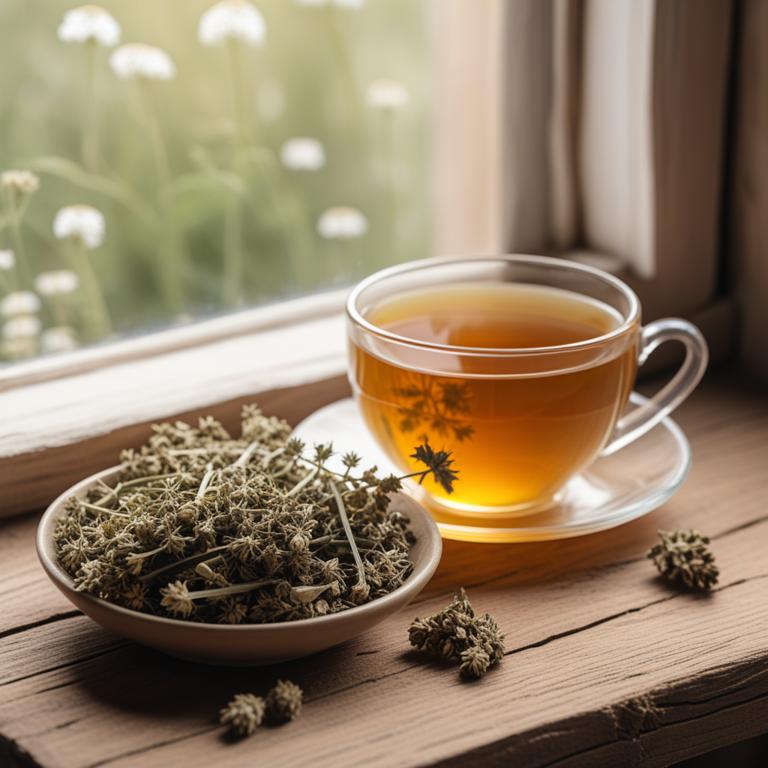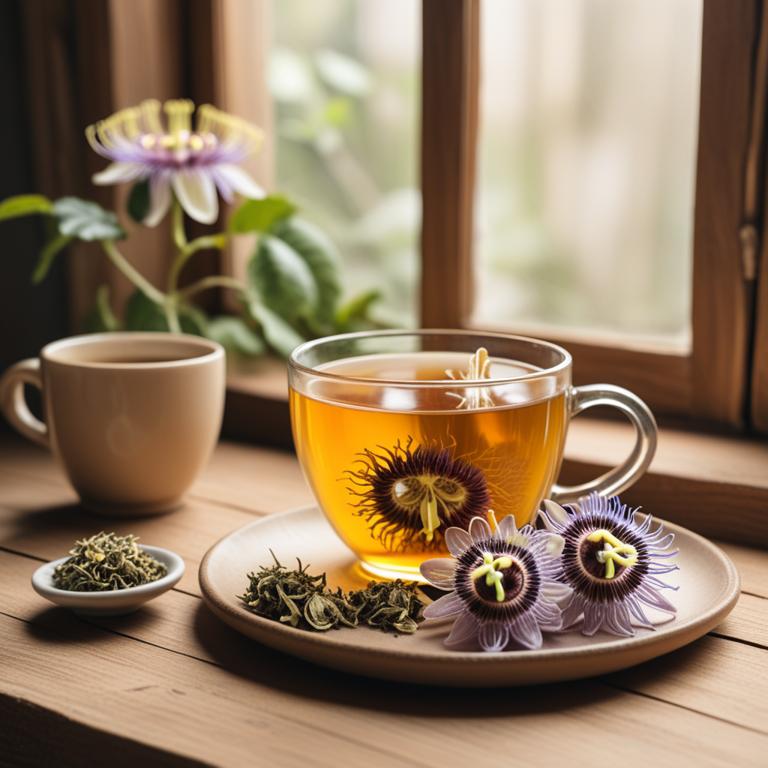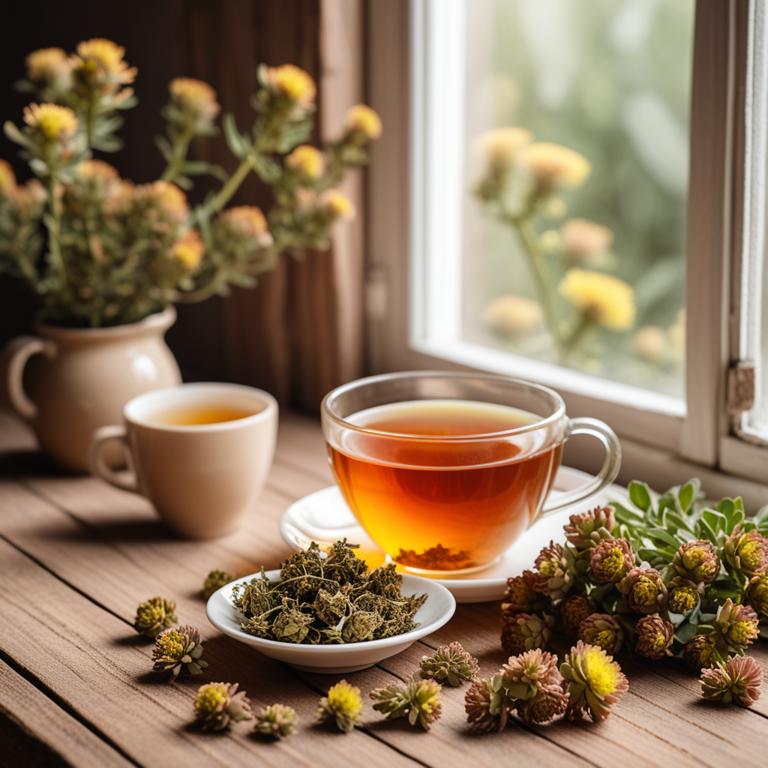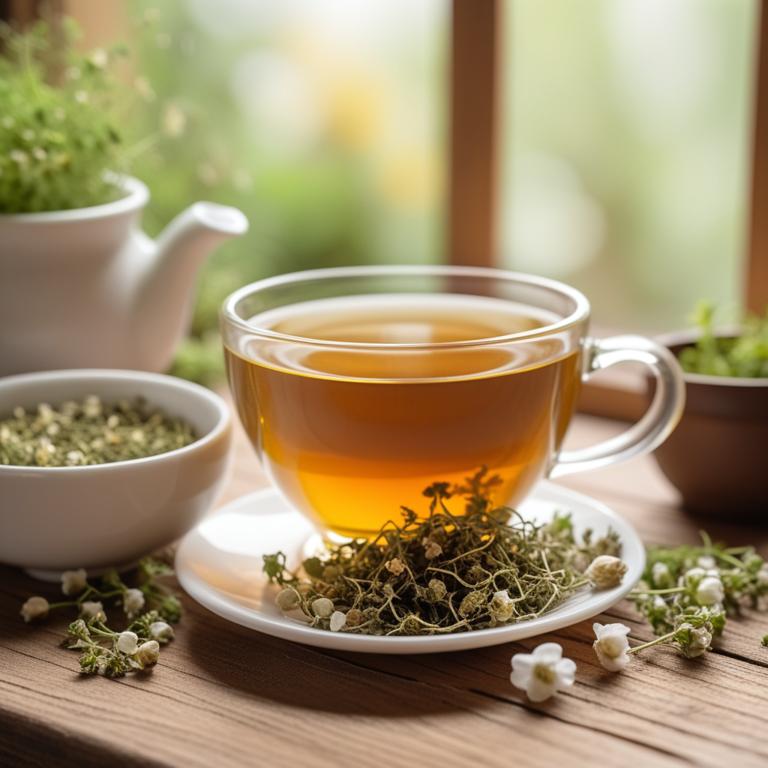11 Best Herbal Teas For Stress

Herbal teas for stress are a type of herbal remedy that uses the medicinal properties of plants to help alleviate symptoms of anxiety, tension, and emotional distress.
These teas have been shown to have numerous benefits, including reducing cortisol levels, promoting relaxation, and improving sleep quality.
Some popular examples of herbal teas used to treat stress include chamomile, which calms the mind and soothes the nervous system; lavender, which promotes a sense of calm and tranquility; peppermint, which helps to reduce anxiety and improve focus; passionflower, which has a sedative effect; valerian root, which promotes deep relaxation; ginseng, which helps to balance the body's energy; and lemon balm, which has a calming effect on the nervous system.
By incorporating these teas into one's daily routine, individuals can find natural relief from stress and promote overall well-being.
According to "Gigiena i sanitariia", teas for stress may help reduce the magnitude of sympathoadrenal system tension and exert an optimizing effect on the mechanisms responsible for regulation of the cardiovascular system.
Below there's a list of the 11 best herbal teas for stress.
- 1. Valeriana officinalis teas
- 2. Passiflora incarnata teas
- 3. Lavandula angustifolia teas
- 4. Cinchona officinalis teas
- 5. Rhodiola rosea teas
- 6. Melissa officinalis teas
- 7. Avena sativa teas
- 8. Panax ginseng teas
- 9. Bacopa monnieri teas
- 10. Curcuma longa teas
- 11. Ginkgo biloba teas
Also you may be interested in...
TODAY'S FREE BOUNDLE
Herb Drying Checklist + Herbal Tea Shopping List + Medicinal Herbs Flashcards
Enter you best email address below to receive this bundle (3 product valued $19.95) for FREE + exclusive access to The Aphotecary Letter.
$19.95 -> $0.00
1. Valeriana officinalis teas

Valeriana officinalis teas, derived from the root of the valerian plant, have been used for centuries to treat stress and anxiety due to their sedative and calming properties.
The herbal preparation helps to treat stress by promoting relaxation, reducing restlessness and insomnia, and improving sleep quality.
The bioactive constituents of Valeriana officinalis teas, including valerenic acid, isovaleric acid, and valeranone, contribute to their anxiolytic and sedative effects by interacting with the GABA receptors in the brain.
Regular consumption of Valeriana officinalis teas has been shown to provide numerous benefits, including reduced symptoms of anxiety and depression, improved mood, and enhanced overall well-being.
Related Study
According to the scientific study, Valeriana officinalis teas for stress may be beneficial due to their anxiolytic effects, which can help alleviate anxiety and promote relaxation.
2. Passiflora incarnata teas

Passiflora incarnata teas have been traditionally used to treat stress and anxiety due to their calming and sedative properties.
The herbal preparation helps to treat stress by promoting relaxation, reducing anxiety and insomnia, and improving sleep quality.
This is attributed to the presence of bioactive constituents such as flavonoids, alkaloids, and glycosides, particularly harman and harmine, which possess anxiolytic and sedative effects.
The benefits of Passiflora incarnata teas in treating stress include reduced symptoms of anxiety and depression, improved mood, and enhanced overall well-being.
Related Study
According to the provided scientific study, Passiflora incarnata teas, similar to P. sidaefolia, can be used for stress due to its anxiolytic-like effects, which reduce anxious-like behavior in mice.
3. Lavandula angustifolia teas

Lavandula angustifolia teas, derived from the flowers of the lavender plant, have been traditionally used to alleviate stress and its associated symptoms.
The calming properties of Lavandula angustifolia teas are attributed to their ability to modulate the body's response to stress, promoting relaxation and reducing anxiety.
The bioactive constituents, including linalool and linalyl acetate, have been shown to interact with the brain's GABA receptors, which helps to calm the nervous system and reduce feelings of stress and anxiety.
Regular consumption of Lavandula angustifolia teas has been found to provide several benefits, including improved sleep quality, reduced symptoms of anxiety and depression, and enhanced overall well-being.
Related Study
According to "Molecules (Basel, Switzerland)", Lavandula angustifolia teas may help alleviate symptoms of mental stress due to its sedative and antidepressant properties.
4. Cinchona officinalis teas

Cinchona officinalis teas have been used to treat stress-related ailments due to their adaptogenic properties, which help the body adapt to stress and promote balance.
This herbal preparation contains bioactive constituents such as quinine and alkaloids, which have been shown to have a calming effect on the nervous system, thereby reducing stress and anxiety levels.
The benefits of Cinchona officinalis teas in treating stress include improved mood, reduced anxiety, and enhanced sleep quality, making it a popular natural remedy for those seeking to manage stress effectively.
Regular consumption of Cinchona officinalis teas can lead to a sense of calm and relaxation, helping individuals cope with the demands of modern life.
Related Study
According to the study, Cinchona officinalis teas for stress may be beneficial due to the presence of V officinalis, which has been thoroughly investigated and found to produce anxiolytic and sedative effects.
5. Rhodiola rosea teas

Rhodiola rosea teas have been traditionally used to treat stress-related ailments due to their adaptogenic properties, which help the body adapt to stress and promote balance.
The herbal preparation contains bioactive constituents such as rosavin, rosin, and salidroside, which have been shown to have a positive effect on mental health by reducing fatigue, anxiety, and depression.
Rhodiola rosea teas help to treat stress by increasing the production of neurotransmitters like serotonin and dopamine, which regulate mood and cognitive function, and by reducing the levels of cortisol, a hormone associated with stress.
The benefits of using Rhodiola rosea teas to treat stress include improved mood, reduced anxiety, enhanced cognitive function, and improved sleep quality.
Related Study
According to "Molecules (Basel, Switzerland)", Rhodiola rosea teas for stress have shown potential in managing various aspects of stress-induced conditions, including symptoms of life-stress, fatigue, and burnout, as well as enhancing physical performance and mental productivity.
6. Melissa officinalis teas

Melissa officinalis teas, also known as lemon balm tea, have been traditionally used to treat stress and anxiety-related ailments due to its calming and soothing properties.
The bioactive constituents of Melissa officinalis, such as rosmarinic acid, apigenin, and luteolin, have been found to possess anxiolytic and sedative effects, helping to reduce stress and promote relaxation.
Drinking Melissa officinalis tea helps to calm the mind and body, reducing feelings of anxiety and stress, and promoting a good night's sleep.
The benefits of consuming Melissa officinalis tea to treat stress include improved mood, reduced fatigue, and enhanced overall well-being, making it a popular natural remedy for stress relief.
Related Study
According to "BMC complementary medicine and therapies", Melissa officinalis teas may be effective in reducing depression and anxiety severity in patients with type 2 diabetes with depressive symptoms.
7. Avena sativa teas

Avena sativa teas, also known as oat straw tea, have been traditionally used to treat stress and anxiety due to their calming properties.
The bioactive constituents of Avena sativa, including avenacosides, avenanthramides, and phenolic acids, help to reduce stress by acting as a natural sedative and promoting relaxation.
This herbal preparation helps to treat stress by regulating the body's response to stress, promoting a sense of calmness, and improving sleep quality.
The benefits of Avena sativa teas in treating stress include reduced anxiety and depression, improved mood, and enhanced overall well-being.
Related Study
According to "Biomedicine & pharmacotherapy = Biomedecine & pharmacotherapie", Avena sativa teas for stress may have potential benefits in reducing stress and anxiety due to the presence of phytochemical compounds like flavanoids, which have shown anti-depressant activity in various experimental studies.
8. Panax ginseng teas

Panax ginseng teas have been widely used to treat stress-related ailments due to their adaptogenic properties, which help the body to adapt to stress and promote balance in physiological processes.
This herbal preparation helps to treat stress by reducing cortisol levels, improving mood, and enhancing cognitive function.
The bioactive constituents of Panax ginseng, such as ginsenosides and panaxynol, play a crucial role in reducing oxidative stress, inflammation, and anxiety, ultimately leading to improved stress resilience.
The benefits of Panax ginseng teas in treating stress include reduced anxiety and depression symptoms, improved sleep quality, and enhanced overall well-being.
Related Study
According to "Journal of ethnopharmacology", Panax ginseng teas for stress may be effective in reducing anxiety, as both white and red varieties of ginseng showed anxiolytic activity in various experimental paradigms, comparable to the effects of diazepam.
9. Bacopa monnieri teas

Bacopa monnieri teas have been traditionally used to treat stress and anxiety-related ailments due to their adaptogenic properties, which help the body adapt to stress and promote balance.
The bioactive constituents of Bacopa monnieri teas, such as bacosides A and B, brahmoside, and aculeatin, are responsible for their therapeutic effects, including enhancing memory and cognitive function, reducing stress and anxiety, and improving sleep quality.
Regular consumption of Bacopa monnieri teas has been shown to help individuals manage stress and anxiety by promoting relaxation, improving mood, and reducing symptoms of depression.
The benefits of using Bacopa monnieri teas to treat stress and anxiety include reduced stress levels, improved cognitive function, enhanced mood, and improved overall well-being.
Related Study
According to "Indian journal of experimental biology", Bacopa monnieri teas for stress have been found to exhibit significant anti-anxiety and anti-depressant activity, effectively combating mixed anxiety-depressive disorders.
10. Curcuma longa teas

Curcuma longa teas have been used for centuries to treat stress and anxiety due to their calming and relaxing properties, which help to reduce feelings of overwhelm and promote a sense of well-being.
The bioactive constituents of Curcuma longa, including curcumin, turmeric oil, and other polyphenolic compounds, play a crucial role in reducing inflammation and modulating the body's stress response, thereby alleviating symptoms of stress and anxiety.
The consumption of Curcuma longa teas has been shown to have a positive impact on mental health, reducing symptoms of depression and anxiety, and improving overall quality of life.
The benefits of using Curcuma longa teas to treat stress and anxiety include reduced inflammation, improved mood, and enhanced cognitive function, making it a natural and effective remedy for managing stress and promoting overall well-being.
Related Study
According to "Advanced biomedical research", Curcuma longa teas for stress relief may be beneficial due to the modulation of physiological and biochemical processes by curcumin, its chief constituent.
11. Ginkgo biloba teas

Ginkgo biloba teas have been widely used to treat stress and anxiety due to their adaptogenic properties, which help the body to adapt to stressful situations.
The bioactive constituents of Ginkgo biloba, including flavonoids and terpenoids, work together to promote relaxation and reduce stress levels.
These constituents help to modulate the body's response to stress by regulating cortisol levels, improving mood, and enhancing cognitive function.
The benefits of Ginkgo biloba teas in treating stress include reduced anxiety and depression symptoms, improved sleep quality, and enhanced overall well-being.
Related Study
According to the study, Ginkgo biloba teas for stress have been shown to have a positive effect in reducing anxiety under pathological conditions.